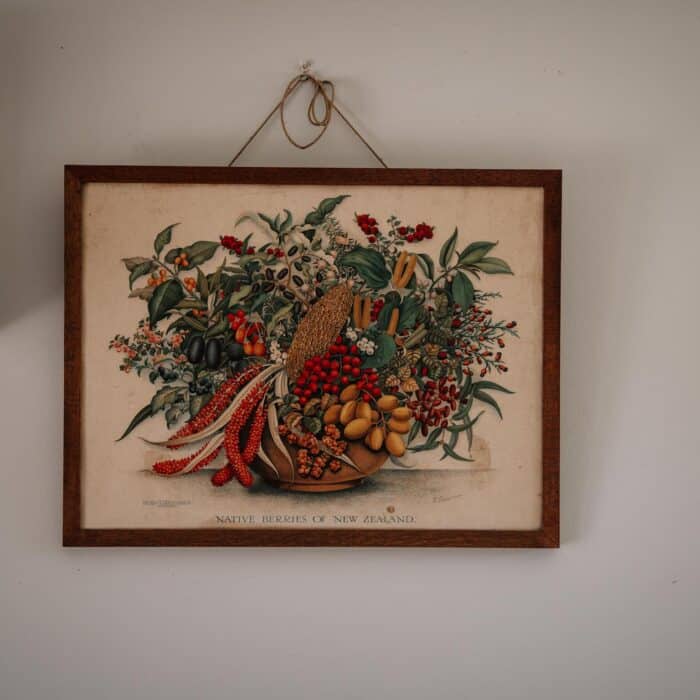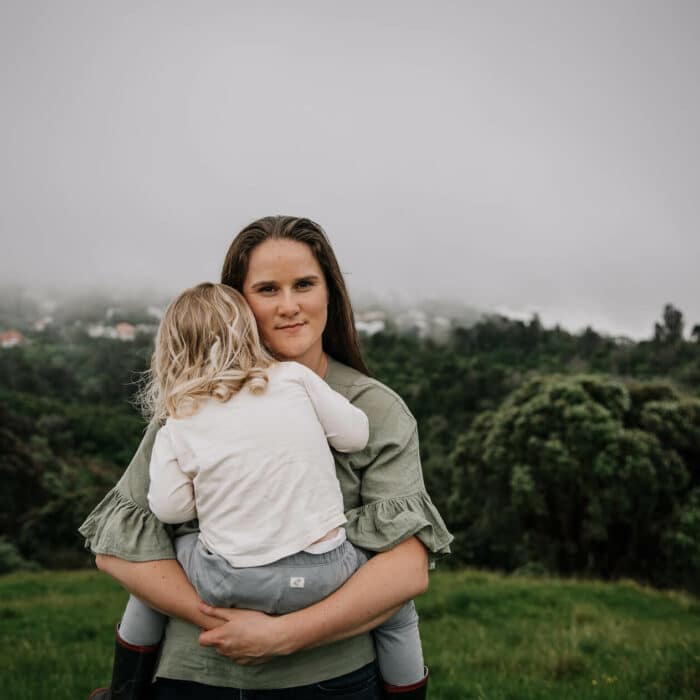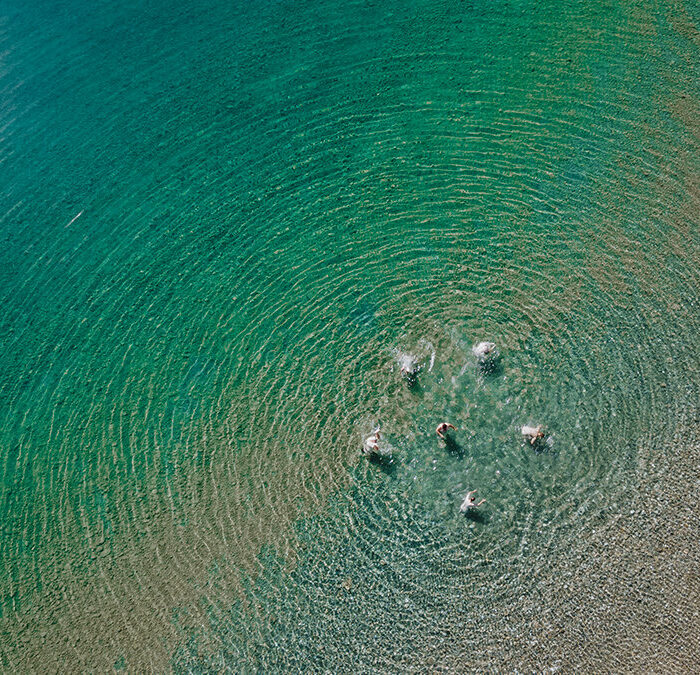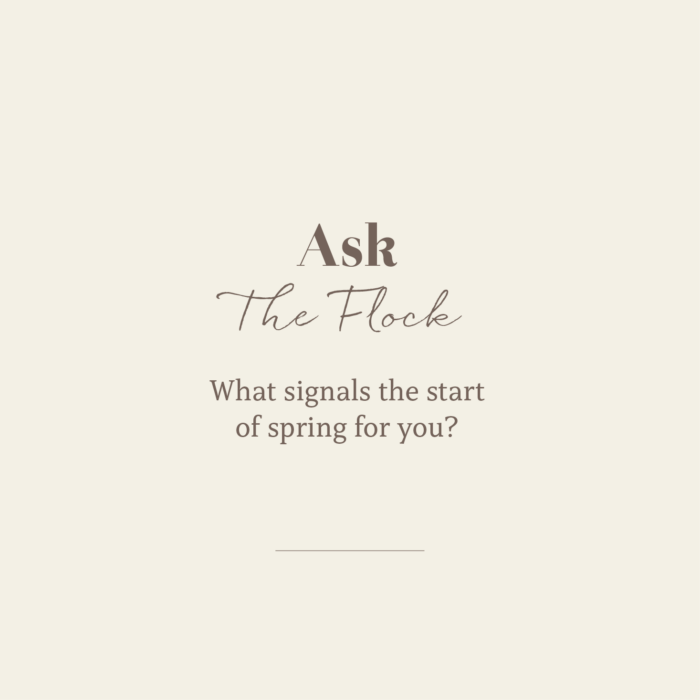10 June 2022
A Living Tapestry
writer: Georgia Merton
photographer: Francine Boer
Papakāinga. Homestead.
The grounds at Josephine Ward’s Ōtautahi Christchurch home are her personal sanctuary. For decades, this botanist, teacher, mother, partner and lifelong advocate for beauty has gardened through all of life’s joys and difficulties, imbuing her villa with the memory of many lives lived.

Top. Josephine with “Mutabilis,” one of her favourite roses for the garden. “I wouldn’t want to live without roses.” Above. Josephine says, “I sit here on the verandah or lie in the hammock and think it’s just beautiful.”
There are some spaces that, once you cross their threshold, have the power to slow your footsteps, soften your shoulders and widen your eyes. Spaces shaped by time and love where, unlike much of our hurtling world, beauty is given priority over efficiency. Josephine’s garden is such a space. Just metres from a busy road, towering linden and weeping elm trees shade a spread of blooming roses and rhododendrons. Tucked next to the old weatherboard homestead, a proud orange tree groans and scatters its heavy fruit.
“Oh, yes, I find a lot of beauty in my garden,” says Josephine, 82, “though it’s in the worst shape it’s been in years!” Sitting on the small white verandah, framed by her “Mermaid” – a type of climbing rose and a “rampant grower” – her eyes smile over her mask. “The green thumb is genetic, I think. Both my parents were gardeners, and their parents were gardeners. I think I wouldn’t like to be without a garden at all.”
Pink-and-white Erigeron karvinskianus daisies. "I grow it to hide the ugly concrete foundations of the house."
What she has created is an oasis, a stronghold of green space amidst in-fill housing and the busy movement of a sprawling city pressing at its boundaries. The birdsong is hearty, but these days it has competition. "All I can hear now is the traffic," Josephine says. "There used to be bare land out the back and a big orchard. It was just magic, and there were no fences so it was a very big playground for my children."
The seasons of Josephine's life have flourished against this living backdrop: a long career of research into the evolutionary relationships of native daisies; a doctorate; many years of teaching; two children; two partners. As she speaks, the old villa - the house Josephine and her first husband, John, bought together - and its garden start to fill up with a lifetime of memories.
"It was very romantic, because we were teenage sweethearts. We had broken up and he had gone to Canada. I had lots of boyfriends in the following twelve years but I didn't marry any of them and, looking back, I suppose I was hanging out for John," she says. In the meantime, Josephine was busy establishing herself as a scientist. While the green thumb may have been inherited, her career as a botanist, she explains, was a happy accident.
"I would have chosen English literature and French, but my father would finance me only if I did science. So I did botany and zoology majors, and I was planning on studying insects. But the professor of zoology specialised in marine worms and, in those days, your thesis was chosen for you by your professor. I don't like marine worms, so I became a botanist instead!" she says. By the time Josephine was a senior student at the University of Canterbury, she had started teaching. Meanwhile, her first love was persistent.
"He came back every Christmas, and he always proposed to me, but it was more of a standing joke. Then, when he came back in 1968, he had sailed from Hawaii to New Zealand to bring back a yacht with a pile of other people, and I thought, 'Well, if he can do that he must be OK,'" Josephine says with a laugh. She married him, resigned from the university and the pair went to Canada to save for a house. This was where her son, Jason, was born.


It had the makings of a dream life, but reality is rarely that simple. "Everybody thought it was a fairy story, but he had bipolar disorder. It was very difficult to deal with, and I was stuck because I was madly in love with him. You can't leave, and it's so hard to stay as well," she says. They came back to New Zealand and, whilst raising Jason and baby daughter Jolie - and also establishing her garden - Josephine was reappointed to her position at the university and completed her doctorate on the properties of little-known native daisies. She also taught plant diversity and evolutionary biology to first-, second-, third- and fourth-year students. "I didn't rest much," she says, "but I didn't get bored!"
After several years, Josephine left her husband. While it was a liberating decision, things were far from easy. "I could run things the way I wanted, but that was probably the most hard-working time of my life. We shared custody of the children and I bought my husband out of the house, so I had three mortgages," she says. And, of course, there was the garden, which Josephine tended throughout it all. It was her place of solace, and of resilient blooming.
"Gardening for me is more renewing than restful, and a lot of it is just plain hard slog," she says, "but it's satisfying work, and when I wasn't doing field work, I needed something to do out in the open air or I'd go mad." Though teaching ate up more of her time than she would have liked, it was the work on daisies that really enchanted her.
"As garden plants, I'm not particularly fond of them; but as a study subject, they have such interesting problems. We look at how they've evolved in New Zealand, where they've evolved from and how they're related to each other. And we give them proper names," she says - referencing the genus Rachelia, which is named after the mountain range where it grows - the fascination alive in her voice. "Oh, we worked in magic spots. My favourites are in Central Otago and Molesworth Station - the higher and drier areas where these daisies are found."
"I love having a big garden. Always new things to try and the space to try them."
According to Josephine, her scientific expeditions were more enjoyable than holidays. "People used to feel sorry for me because I never took holidays. But if I had some time I'd rather do field work than sit on the beach," she says. It was through this dedication to her work that her relationship with her second partner - who she dubs "John No. 2" - began to grow. Her eyes soften when she speaks of him - the fellow explorer with an educated London accent who was appointed to her department as Chair of Botany in 1978. According to Josephine, this John was a scientist with a brain so brilliant and head so hilariously big he struggled to find hats to fit.
"I think I fell in love with his voice first. I found him quite enchanting, but I had no idea he felt the same way about me, not for several years. I was expecting to be pining after him for the rest of my life," she says. "It was a beautiful moment, when we realised each other's feelings." Just like that, love flowered again, this time in the form of a peaceful companion, collaborator in science and fine wine connoisseur.
Josephine and John No. 2 continued to live and work side by side until he died four years ago. "We had a very happy time together - an absolutely different experience from my ex-husband. I found it very special, and I certainly hadn't experienced anything like it before. He loved peace and quiet and he thought I was serene, which I found very funny," she says.
Josephine does, as her second partner perceived, have an air of serenity, which she puts down to the choices she's made. "I've always been an anxious person, and having a garden has such a calming effect. John No. 2 was also very good because he was such a peaceful person. We would often go for a long time over an evening without talking, because we didn't really need to. I was very lucky. And he was happy, so that was good," she laughs. "It's been a great life."
At eighty-two, Josephine is still on task. After all, there are still daisies to be named, papers to be written and garden experiments to be conducted. "There's always somewhere you can put things, always some idea you can carry out," she says, waving out towards her trees. Indeed, her garden is a testament to this - many small, beautiful experiments woven into a great, richly scented tapestry. And she still finds time to lie in her hammock and admire her handiwork.



This story is part of THREAD, a year-long project by Shepherdess made possible thanks to the Public Interest Journalism Fund through NZ On Air.
If you enjoyed this story, please share with someone else.
This story appeared in the Takurua Winter 2022 Edition of Shepherdess.
Get your hands on a copy.
Related Stories
Love in the Back Blocks
A future husband was the last thing Jaimee Coulter expected to find when she was doing her rounds as a fertiliser rep.



